| |||||
| Decades: | |||||
|---|---|---|---|---|---|
| See also: | |||||
Events in the year 2013 in Burkina Faso .
| |||||
| Decades: | |||||
|---|---|---|---|---|---|
| See also: | |||||
Events in the year 2013 in Burkina Faso .

Burkina Faso is a landlocked country in West Africa with an area of 274,200 km2 (105,900 sq mi), bordered by Mali to the northwest, Niger to the northeast, Benin to the southeast, Togo and Ghana to the south, and the Ivory Coast to the southwest. As of 2021, the country had an estimated population of 20,321,378. Previously called Republic of Upper Volta (1958–1984), it was renamed Burkina Faso by President Thomas Sankara. Its citizens are known as Burkinabès, and its capital and largest city is Ouagadougou. Its name is often translated into English as the "Land of Honest Men".
Norbert Zongo, also known under the pen name of Henri Segbo or H.S., was a Burkinabé investigative journalist who managed the newspaper L'Indépendant in Ouagadougou, Burkina Faso. Under Zongo's supervision, L'Indépendant exposed extortion and impunity within the government of Burkina Faso President Blaise Compaoré. He was assassinated after his newspaper began investigating the murder of a driver who had worked for the brother of Compaoré.

Thomas Isidore Noël Sankara was a Burkinabè military officer, Marxist revolutionary and Pan-Africanist who served as President of Burkina Faso from his coup in 1983 to his assassination in 1987. He is viewed by supporters as a charismatic and iconic figure of revolution.

Blaise Compaoré is a Burkinabé-Ivorian former politician who served as the second president of Burkina Faso from 1987 to 2014. He was a close associate of the first president, Thomas Sankara, during the 1980s, and in October 1987, he led a coup d'état during which Sankara was killed. Subsequently, he introduced a policy of 'rectification', overturning the leftist and Third Worldist policies pursued by Sankara. He won elections in 1991, 1998, 2005 and 2010, in what were considered unfair circumstances. His attempt to amend the constitution to extend his 27-year term caused the 2014 Burkinabé uprising. On 31 October 2014, Compaoré resigned, whereupon he fled to the Ivory Coast.
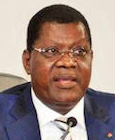
Youssouf Ouédraogo was a Burkinabé politician. In 1992 he became the first Prime Minister of Burkina Faso since 1983, serving from 16 June 1992 to 22 March 1994. Ouédraogo, a member of the ruling Congress for Democracy and Progress (CDP), later served as Minister of State for Foreign Affairs from January 1999 to June 2007.

Chantal Compaoré, born Chantal Terrasson de Fougères is the Franco-Ivorian wife of former President Blaise Compaoré of Burkina Faso. Born in the Dabou, Ivory Coast, after becoming the First Lady in 1987 she spent much of her time on charity work in Burkina Faso. Her husband, who came to power in a bloody 1987 military coup, was overthrown in the 2014 Burkinabé uprising. Chantal Compaoré was subsequently forced to flee to her home country, going into exile together with her husband.
The 2011 Burkina Faso protests were a series of popular protests in Burkina Faso.
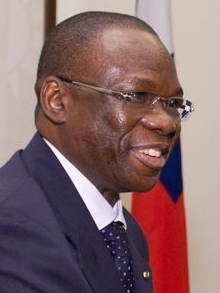
Luc-Adolphe Tiao is a Burkinabé politician and journalist who was Prime Minister of Burkina Faso from 2011 to 2014.

General elections were held in Burkina Faso on 29 November 2015. The elections were the first national elections in the country since the 2014 Burkinabé uprising and the departure of President Blaise Compaoré, who had ruled Burkina Faso for 27 years. The party of former President Compaoré, the Congress for Democracy and Progress, was banned from presenting a presidential candidate in the presidential elections but was still able to participate in the parliamentary election.

The 2014 Burkina Faso uprising was a series of demonstrations and riots in Burkina Faso in October 2014 that quickly spread to multiple cities. They began in response to attempts at changing the constitution to allow President Blaise Compaoré to run again and extend his 27 years in office. Pressure for political change came from civil society and in particular from the country's youth. Following a tumultuous day on 30 October, which included the involvement of former Defence Minister Kouamé Lougué and the burning of the National Assembly and other government buildings as well as the ruling Congress for Democracy and Progress party's headquarters, Compaoré dissolved the government and declared a state of emergency before eventually fleeing to Côte d'Ivoire with the support of President Alassane Ouattara.

Burkina Faso–Taiwan relations referred to the historical relationship between the Republic of China (Taiwan) and Burkina Faso. Taiwan had an embassy in Ouagadougou, and Burkina Faso had an embassy in Taipei. In May 2018, Burkina Faso switched to recognize the People's Republic of China, thus ending diplomatic ties with Taiwan. The last ambassador of Burkina Faso to Taiwan, appointed in August 2017, was Aminata Sana Congo.
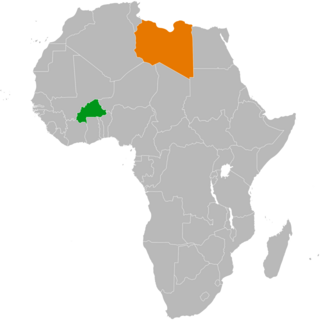
Burkina Faso–Libya relations refers to the current and historical relationship between Libya and Burkina Faso. Libya maintains an embassy in the Burkinabé capital of Ouagadougou, and Burkina Faso has an embassy in the Libyan capital of Tripoli.
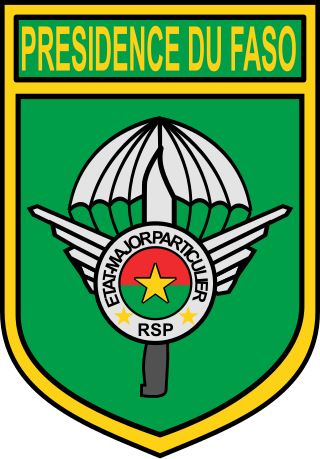
The Regiment of Presidential Security, sometimes known as the Presidential Security Regiment, was the secret service organisation responsible for VIP security to the President of Burkina Faso, a landlocked country in West Africa. It was autonomous from the Army. Until 31 October 2014, the President was Blaise Compaoré, a military officer who came to power in a 1987 coup d'état. The elite unit was well known for its frequent involvement in the politics of Burkina Faso, acting as the iron fist of President Compaoré in his domination of the country. They were said to be widely feared by many people in the country, which in 2012 – two years prior to the end of Compaoré's government – was described by the Democracy Index as an "authoritarian regime".
The following lists events that happened during 2014 in Burkina Faso.
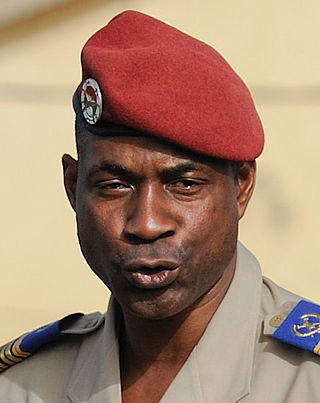
Gilbert Diendéré is a Burkinabé military officer and the Chairman of the National Council for Democracy, the military junta that briefly seized power in Burkina Faso in the September 2015 coup d'état. He was a long-time aide to President Blaise Compaoré, serving as commander of the Regiment of Presidential Security (RSP) during Compaoré's rule. He was appointed as chairman of the junta on 17 September 2015.

Burkina Faso–India relations refers to the international relations that exist between Burkina Faso and India. Burkina Faso maintains an embassy in New Delhi. India maintained an embassy in Ouagadougou from November 1996 until its closure in July 2002. Currently, India maintains an honorary consulate in Ouagadougou, which functions under the jurisdiction of the High Commission of India in Accra, Ghana.
Events in the year 2012 in Burkina Faso.
Events in the year 2011 in Burkina Faso.
Events in the year 2010 in Burkina Faso.